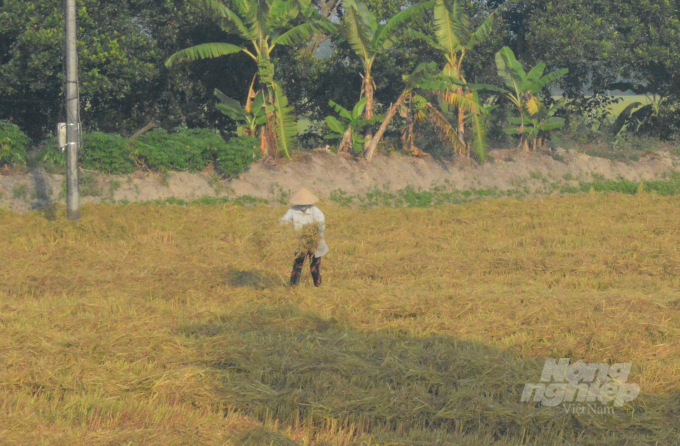November 28, 2025 | 02:39 GMT +7
November 28, 2025 | 02:39 GMT +7
Hotline: 0913.378.918
November 28, 2025 | 02:39 GMT +7
Hotline: 0913.378.918
Every year, Vietnam discharges 156 million tons of agricultural by-products from the production and processing of agricultural, forestry and fishery products, so the question now is how to make money out of this mass of materials. If invested and processed, many useful products could be made which would increase farmers’ incomes and reduce environmental pollution.

After each rice harvest in the Mekong Delta, up to 70% of rice straws and roots are spread out in the field and burnt, causing environmental pollution. Photo: Trung Chanh.
According to Dr. Tong Xuan Chinh, Deputy Director of the Department of Livestock Production (MARD), the total by-products from agricultural, forestry, fishery and livestock production that our country discharged in 2020 was around 156.8 million tons. Among them, the two sectors with the largest by-products are cultivation (88.9 million tons of waste) and husbandry (61.4 million tons).
In his opinion, it is essential to regulate the rate of using inorganic fertilizers in agricultural production, heading towards green, organic and ecological agriculture, and even higher: zero-waste circular agriculture. Furthermore, agricultural, forestry and fishery production, in combination with eco-tourism and agricultural tourism, have much potential for development.
As explained by Mr. Le Van Thiet, Deputy Director of the Plant Protection Department, the Department of Crop Production has recently built models of effective use of organic fertilizers, with the participation of agricultural enterprises and a total budget of VND 526 billion. The Department has built 124 models of rice, fruit trees and vegetables, covering an area of 45,000 ha.
“According to the assessment, Vietnam's agricultural by-products have the potential to bring value of up to USD 4-5 billion/year, but in 2020 it only reached USD 275 million. Therefore, it is necessary to have policies that encourage businesses to collect and process agricultural by-products. Priority should be given to making high value added products, then to organic fertilizer processing", said Dr. Tong Xuan Chinh, proposing some solutions.
Prof. Nguyen Quang Thach, Director of the Institute of Biology (Vietnam National University of Agriculture), said that processing agricultural by-products based on traditional methods such as composting would take too long, therefore the application of technology to processing is recommended.
Currently, it takes just over a week for some organic fertilizer production businesses to complete the processes. They use machines to shred and heat to dry raw materials, eliminate all harmful microorganisms, pathogens, etc, then add beneficial microorganisms to create products.

Every year the Mekong Delta discharges millions of tons of husks from rice processing, which can be made into rice husk firewood, to generate biomass power, serve as biological bedding in husbandry, and create organic fertilizers. Photo: Trung Chanh.
As one of those who has been using agricultural by-products in production, Ms. Nguyen Thi Thien, Director of Thai Hung Thinh JSC (HCMC), said that their farm in Binh Phuoc province has applied a pig raising model with a scale of 500 heads/farm. The farming process includes utilizing biological products to handle waste, leaving absolutely no odor. During the past five years, the company has never received news of pig disease outbreaks causing damage.
Ms. Thien has made several proposals such as a method of processing durian skin to make activated carbon and wood vinegar for agricultural production or using Ben Tre province’s coconut tree products to make products with similar functions. The by-products will then be used for coconut-shrimp farming, which brings high added value to gardeners.
Upon concluding the webinar, Deputy Minister of Agriculture and Rural Development Tran Thanh Nam said that in the near future the agricultural industry needs to focus on making full use of the potential of agricultural by-products. It must be understood that agricultural by-products are not waste, and the output of one production sector can be the input of another production sector, bringing higher value and forming a circular agricultural chain.
Translated by Samuel Pham

(VAN) On November 27, in the meeting with Minister Tran Duc Thang, Mayor Yin Yong shared Beijing’s experience to improve environment and air quality.

(VAN) After 30 years, both sides identified strategic areas of cooperation: sustainable production, increasing coffee value and training for farmers.
/2025/11/27/4910-4-164708_294.jpg)
(VAN) On the afternoon of November 27 in Beijing, Minister of Agriculture and Environment Tran Duc Thang held a working session with several major Chinese enterprises operating in the agriculture and environment sector.

(VAN) The Department of Animal Health issued a provisional guideline requesting local authorities to increase surveillance, collect samples for testing, and conduct epidemiological investigations according to the established procedure.

(VAN) The United Nations recommends that Vietnam utilize data and artificial intelligence to enhance early disaster warnings and reduce GDP losses by 3.2% in the context of climate change.

(VAN) On the morning of November 27 in Beijing, Minister Tran Duc Thang and the Deputy Commissioner General of the General Administration of Customs of China signed a protocol on fresh jackfruit exports.

(VAN) As floodwaters recede, a vast network of irrigation works across eastern Gia Lai is emerging in a state of severe disrepair, with extensive damage demanding urgent restoration ahead of the 2025-2026 winter-spring cropping season.